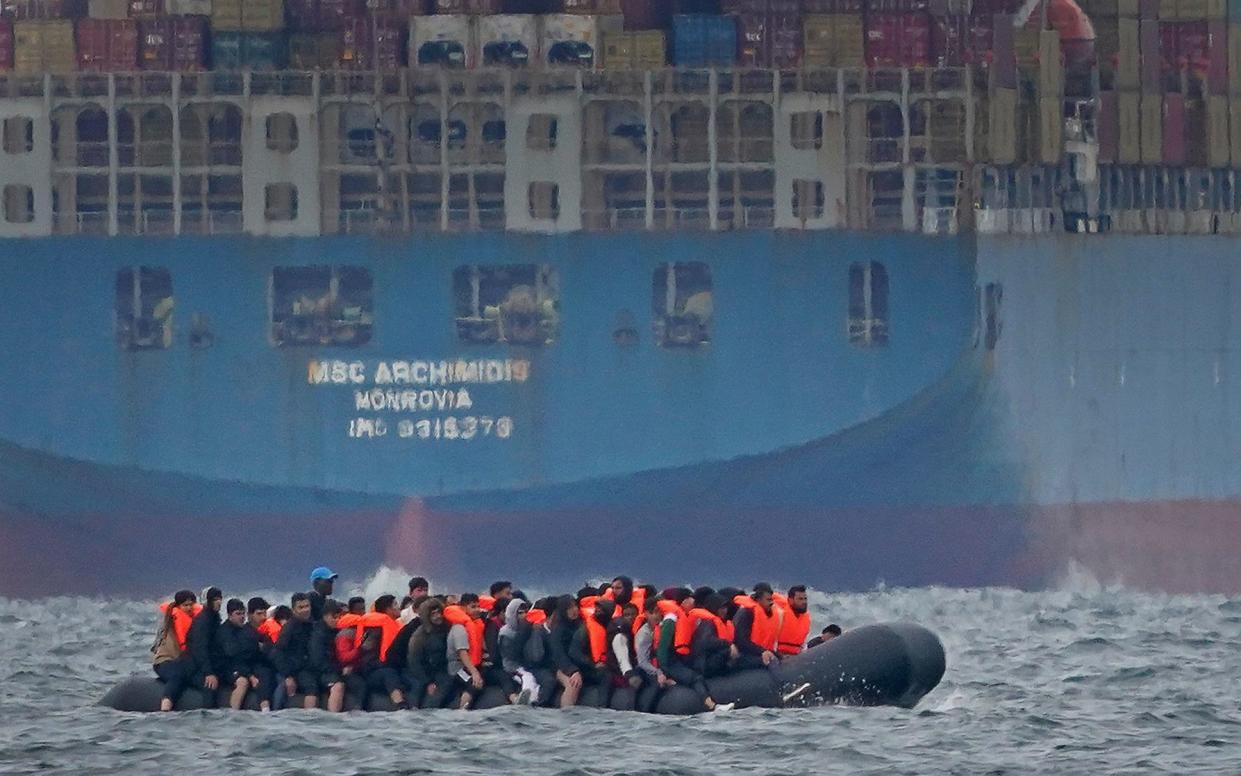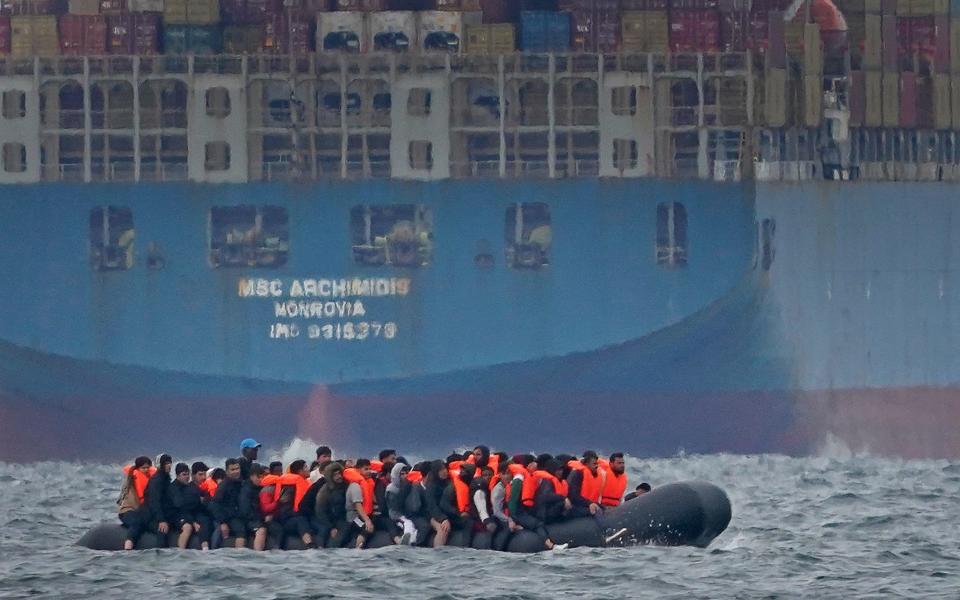EU is impotent on the migrant crisis, says Robert Jenrick

- Oops!Something went wrong.Please try again later.
The EU is impotent on the migration crisis and most member states lack the ambition to act, says the UK’s former immigration minister.
In an exclusive article for The Telegraph, included in full below, Robert Jenrick criticises the European Commission and member states for failing to come up with a credible plan to intercept, turn back or repatriate migrants.
He claims that the EU deal announced on Wednesday to tighten borders and share the burden of housing asylum seekers is “not worth the paper it’s written on” as it dealt only with the symptoms of the migration crisis rather than “delivering the cure”.
His comments will touch a raw nerve in the EU as he was the minister tasked by Rishi Sunak with developing agreements and co-operation with European nations to try to stem the flow of migrants across the Continent before they reached northern France and crossed the Channel on small boats.
He cites as an example of the “poverty of ambition” and “hollow words” of the commission its failure to sanction tactics that would enable European countries to intercept the boats and other equipment as they are transported by people-smuggling gangs from Turkey to Germany and then France.
Britain has been lobbying the commission to give approval for states to use health and safety laws to seize the boats as being unseaworthy and so in breach of EU regulations. Government insiders said the commission could issue an edict sanctioning the move, which would protect against legal action by those involved in the trade.
However, Mr Jenrick said: “The commission’s rhetorical commitment to end the supply of dangerous small boat equipment rings hollow when in practice it refuses to provide legal cover for individual states to seize these consignments, despite sustained engagement from myself and other senior government ministers.
“We have made progress bilaterally to seize equipment destined for the Channel with allies like Bulgaria, but with no thanks to the EU.”
Few successes
Mr Jenrick said it had been left to individual countries to fight illegal migration with only a few successes, such as Poland’s closely guarded border fence and Greece’s controversial turn-backs of migrant boats at sea.
He said the EU had demonstrated a “chronic inability” to enforce its external borders. Even Italy – a close ally of Britain on tackling migration with its Rwanda-style offshoring deal with Albania – had stepped away from Greek-style turn-backs, he added.
Similarly the French navy’s interception rate for small boats remained “stubbornly low” because of its “extremely cautious approach” to intervening to stop the boats at sea. This contrasted with Belgium, which intervened at sea and had slashed crossings as a result.
“If all our near neighbours could enforce their borders with the same zeal as Poland, we would face a much-reduced challenge,” said Mr Jenrick. “Time and again, the EU has proven geopolitically impotent.
“While we must continue to engage and co-operate with Brussels wherever we can – and I have travelled to more countries than anyone, seeking to build partnerships on illegal migration – we must confront the reality that nation states must act unilaterally when the vital national interest of border security is on the line.”
More robust approach
He said the UK’s Rwanda policy – to deport illegal migrants to the African nation to claim asylum there – had the potential to break the people smugglers’ business model, provided the Government opted for a more robust approach to block legal challenges to the plan.
Mr Jenrick warned that unless the EU toughened up its approach, it risked seeing more Right-wing politicians such as Holland’s Geert Wilders coming to power “on the back of public fury at lax border controls”.
“His success is merely a foretaste of what is to come. The great irony is that by failing to do what is necessary they are bringing about the political conditions for the failure of the entire European project,” he said.
The EU is resigned to illegal migration – their hollow words fool no-one
By Robert Jenrick

Against a backdrop of confected liberal outrage, Giorgia Meloni hosted Rishi Sunak and Eddie Rama on Sunday to discuss the European migration crisis.
Written off in advance as a “far-Right” gathering of fringe politicians, what was more newsworthy was who wasn’t in attendance.
The two dominant forces in the EU, France and Germany, did not attend. Nor did Ursula Von der Leyen, the European Commission president. Their collective absence was emblematic of the indifference at the heart of the EU when it comes to tackling illegal migration. A few months earlier, at a gathering of the European Political Community in Grenada, the Spanish hosts had deemed the topic too contentious for the main agenda. Crisis? What crisis?
This week ended with an agreement of sorts: the EU’s “New Pact on Migration and Asylum”. Cue much backslapping in Brussels. An ebullient Ylva Johansson, the European commissioner for home affairs declared: “We did it!”. I highly doubt the public will view it so fondly should they read its threadbare contents, nor history view it favourably.
For all their talk of “intensifying the fight against smugglers” and providing a “European response” to a “European challenge”, the EU’s plan for tackling illegal migration is not worth the paper it’s written on.
Abroad, their hope is to stem the flow towards Europe’s border by boosting the state capacity of key countries in their neighbourhood, like Tunisia. However, progress is glacial as some north African leaders prove unreliable partners. As I saw for myself when I visited Tunisia in the spring, the deep-rooted structural weakness in the Tunisian state is not something that can be remedied by throwing millions of euros at modest development programmes. On the off-chance these efforts succeed, the improvements will materialise in decades – time Europe simply doesn’t have the luxury of.
Internally, the Commission plans to strengthen their external borders by investing in the European Border Agency, Frontex. But the poverty of ambition is striking. The delivery of new technology and officers is nowhere near commensurate with the scale of the problem, with over a million new asylum applications in the latest 12-month period – the highest since the last migrant crisis in 2016. The Commission’s rhetorical commitment to end the supply of dangerous small boat equipment rings hollow when in practice it refuses to provide legal cover for individual states to seize these consignments, despite sustained engagement from myself and other senior government ministers. We have made progress bilaterally to seize equipment destined for the Channel with allies like Bulgaria, but with no thanks to the EU.
On my many visits and calls to EU member states as immigration minister it was clear that politicians there privately view illegal migration as a damage limitation exercise. Having resigned themselves to mass illegal migration, the EU Commission is now fixated on treating the symptoms of the problem, not delivering the cure. The “Pact” that has consumed the Commission since it was proposed back in 2020 will simply see asylum claims logged and vetted before “mandatory solidarity” provisions force states to accommodate them or pay others to do so across the bloc. There isn’t a credible plan to repatriate people to their home countries if their claims are refused. It amounts to little more than an audit trail of failure. And to think, Sir Keir Starmer said a Labour government would take the UK into such an arrangement.
It’s as though some European politicians can’t see how their politics is changing, with governments and parties likely to be washed away in the years ahead in the hazardous slipstream of mass illegal migration. Or they do, but can’t abide by the hard choices that follow. Don’t expect Geert Wilders to be the last insurgent to come to power on the back of public fury at lax border controls. His success is merely a foretaste of what is to come. The great irony is that by failing to do what is necessary they are bringing about the political conditions for the failure of the entire European project.
So it has been left to individual countries to take on the fight against illegal migration themselves. And only a small handful have been successful at stemming the flow. As Poland has proven with their closely-guarded border fence, common sense measures like physical infrastructure are highly effective. However morally complex, Greece’s turn-backs of small boats have radically reduced arrivals and, I would argue, saved lives overall.
Few leaders have the determination to adopt such policies. Even the Meloni government, which has staked much on tackling illegal migration, has stepped away from the tactics likely to succeed. Visiting Italy earlier in the year, I was struck by the admirable commitment to saving lives at sea and evident professionalism of its coastguard. But it was clear that there was no operation tasked with actually stopping crossings.
So long as some EU states are unable to defend their borders, the flow of people into Europe will continue unabated. The demand to migrate is so high, and the business model of the gangs so lucrative, that routes into Europe will simply shift to target the weakest juncture. Years ago, a key route was from Turkey through to Greece, today the favoured route is from Tunisia into Italy. If Tunisia’s coastal defences improved overnight, we should expect to see displacement to Libya. And as long as EU politicians remain ideologically wedded to unfettered movement within Schengen – despite the clear, disastrous security flaws of doing so – migrant flows across the European landmass towards western European countries like the UK will continue.
The chronic inability of the EU to enforce its external borders will create deep political fissures within the bloc and terrible outcomes for EU citizens for decades to come. But it doesn’t necessarily preordain disaster for the UK. If all our near neighbours could enforce their borders with the same zeal as Poland, we would face a much-reduced challenge.
Despite incremental improvements, the French interception rate remains stubbornly low. Even as unseaworthy dinghies struggle in the Channel, the French navy adopts an extremely cautious approach to intervening, in stark contrast to their Belgian neighbours. Meanwhile in Ireland the migrant crisis they have created through lax visa scrutiny has seen record asylum claims and homelessness soar, pushing many of these migrants into Northern Ireland. Ultimately neither neighbour possesses the political will or incentives to grip the crisis.
Time and again, the EU has proven geopolitically impotent. While we must continue to engage and cooperate with Brussels wherever we can – and I have travelled to more countries than anyone, seeking to build partnerships on illegal migration – we must confront the reality that nation states must act unilaterally when the vital national interest of border security is on the line.
Here the Government is pursuing our genuinely innovative Rwanda policy, which holds the potential to break the business model of people smuggling gangs if it is implemented at scale. Regrettably, it has thus far opted for the less robust legislation, with the aim of a few symbolic flights. Such a result would be a tragedy for the UK, consigning us to many more years of small boat crossings.
The European outlook is too bleak, our continental partners too divided and the stakes too high for anything other than the most determined approach.

